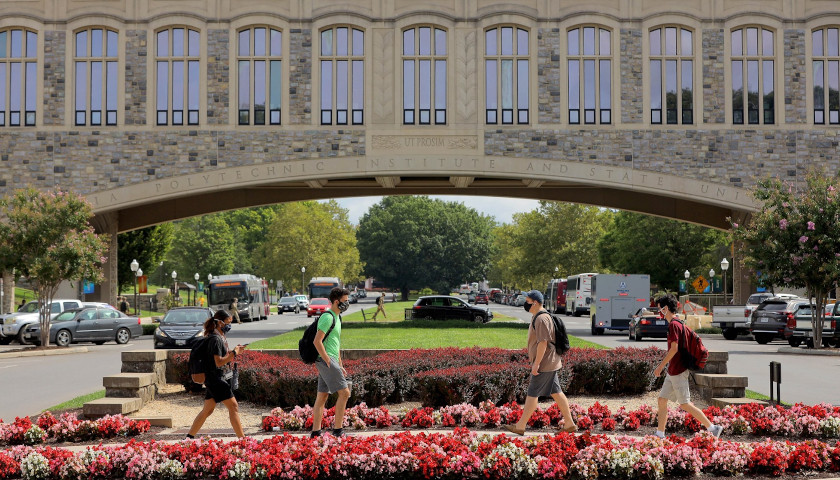Virginia Tech announced that the Spring 2021 semester will continue with a combination of in-person, hybrid, and online classes. According to the Monday announcement, the school’s traditional week-long spring break will be replaced with five individual days off spread over several weeks to discourage students from traveling.
“As was demonstrated during the fall semester, courses may either be fully online, hybrid, or fully-in-person as determined by each instructor. Every effort will be made to continue making progress towards a return to in-person instruction,” the announcement states.
Assistant Vice President for University Relations Mark Owczarski told The Virginia Star that students will not be given discounts or refunds for involuntary online classes.
“Standard tuition and mandatory fees apply for all courses regardless of the modality,” Owczarski said.
The announcement summarized the new spring break format: “These one-day breaks will have no classes, assignments, nor assessments and will begin on Friday, Feb. 5 and will continue on Thursday, Feb. 25; Wednesday, March 17; Tuesday, April 6; and Monday, April 26.”
Frustrated students and community members turned to Facebook to say that the format would not work well. “The one day break won’t really be a break because there will be assignments and assessments that week and this will turn into a study day,” Kristine Kingston, who has a kid attending the school, commented. “Would have been better to at least have attached the days to weekends to give a couple of days in a row.”
Anne Scott Yonke, who is a student, replied to the announcement, “I understand this decision but it’s still disappointing as a current student. It’s hard to justify paying out of state tuition for all or mostly online courses. The online classroom is subpar at best, and as someone who hasn’t had much experience with online classes, I’m not doing well. If we’re doing mostly online courses, there should be the credit/no-credit option that was presented to us last semester.”
Currently, only six percent of classes are being held fully in-person; 30 percent are hybrid, and 64 percent of fall semester courses are online, according to Owczarski. Also she noted that the winter session will be 100 percent online.
Officials haven’t yet decided what percentage of spring classes will be held in each mode. About 8,400 students currently occupy campus residence halls, with approximately 220 rooms set aside for COVID-19 isolation. The school has not cut staffing due to the pandemic.
Director of the Heritage Foundation Center for Education Policy Lindsey Burke said students and families expect more than academic course content when they pay thousands of dollars for college. “Students expect to have that residential experience, they expect to be able to meet another cohort of students that they can work with over the course of their careers, there’s a lot that students expect to get when they pay that hefty tuition price,” Burke said.
“There are quite a few universities across the country that are cutting their tuition prices to reflect the experience that students will have this year that is very different than what a lot of students signed up for,” Burke added. “You look at Southern New Hampshire University is cutting, they’re discounting their tuition by 60 percent this year.”
“For a lot of universities it’s closer to a 10 percent reduction. You can look at Georgetown, Johns Hopkins, they’ve said they’re cutting their tuition by 10 percent this year to reflect that different experience.”
Burke said universities can save money by downsizing non-teaching roles and cutting less-popular courses.
“Colleges certainly have room to cut tuition because they have room to cut costs,” she said. “The non-teaching administrative staff bloat that has accumulated over the years is one of the drivers of ever-increasing costs.”
“Time will tell,” Burke said. Students may gravitate to cheaper universities, or they may pursue non-traditional options like apprenticeships instead of degrees unless universities lower tuition.
“They might not have the luxury of not doing it in the future. Students might say, ‘The product that we’re receiving is not worth the price that we’re paying,'” Burke said. “So we’ll see how long universities can continue to charge full freight and not offer that in-person experience.”
– – –
Eric Burk is a reporter at The Virginia Star and the Star News Digital Network. Email tips to [email protected].
Photo “Virginia Tech Campus” by Virgina Tech.





I personally feel that Virginia Tech is overstepping its bounds. It is not their place to determine whether students should or should not travel. Students work hard and deserve a break in which they can get rest from the pressure of academia. A day here and there, even in the middle of a week, is no break at all.
An alumni and grandmother of both a current junior and freshman